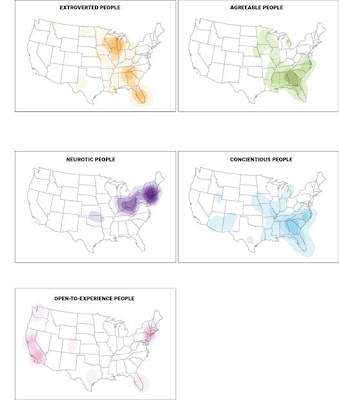A team of researchers at Cambridge University and the University of Toronto has created a five-layer psychogeographic map of the US, mapping the clustering of personality types based on a database of several hundred thousand subjects across the country.
Psychologists have shown that human personalities can be classified along five key dimensions: agreeableness, conscientiousness, extroversion, neuroticism, and openness to experience. And each of these dimensions has been found to affect key life outcomes from life expectancy and divorce to political ideology, job choices and performance, and innovation and creativity.
What's more, it turns out these personality types are not spread evenly across the country. They cluster. And how they cluster tells us much: What city someone might want to move to, the broader character of regions, and even the creative and economic futures of broad swaths of the nation. […]
Interestingly, America's psychogeography lines up reasonably well with its economic geography. Greater Chicago is a center for extroverts and also a leading center for sales professionals. The Midwest, long a center for the manufacturing industry, has a prevalence of conscientious types who work well in a structured, rule-driven environment. The South, and particularly the I-75 corridor, where so much Japanese and German car manufacturing is located, is dominated by agreeable and conscientious types who are both dutiful and work well in teams.
The Northeast corridor, including Greater Boston, as well as San Francisco, Los Angeles, Seattle, and Austin, are home to concentrations of open-to-experience types who are drawn to creative endeavor, innovation, and entrepreneurial start-up companies. While it is hard to identify which came first - was it an initial concentration of personality types that drew industry, or the industry which attracted the personalities? - the overlay is clear.
(Emphasis added. No word on whether the Canadian researchers on the team turned their analytic cartography back upon their native land, although most Americans would say, perhaps unfairly, that Canada should be mapped uniformly in whatever color signifies politeness.)
Here are the maps for the five psychological dimensions (apologies to Alaska and Hawaii, who apparently weren't included, but surely must be at least a little neurotic, or extroverted, or conscientious, etc.):

(Click to enlarge.)
Several questions arise, for example:
I'm not surprised to find a large concentration of neurotic people in the New York-Boston area, but why didn't the data show it extending south to DC? I mean, come on.
What are we to make of that other concentration on the same map, appearing to form a Bermuda Triangle of Neurosis hovering over central-southern Ohio and spilling over into the bordering states?
And while we're on the subject, what's the deal with that one little neurotic fog hovering over Oklahoma like truck exhaust?
Most striking to me is that the Pacific Northwest goes almost completely unremarked--Seattle gets mentioned (along with northern and southern California and Austin) as "home to concentrations of open-to-experience types who are drawn to creative endeavor, innovation, and entrepreneurial start-up companies," but that's about it.
Perhaps Oregon got lost in the glare between the Seattle area and the San Francisco area. But ask any transplants to Oregon (if you can find anyone who'll admit they weren't born here), and they'll tell you that, even before you notice the rain and the Doug firs, you notice that Oregon folks have their own way of looking at things.
And you don't have to have a Keep Portland Weird bumper sticker on your Saab to figure that out. In Oregon, you can legally get a physician's help in committing suicide, but you can't legally pump your own gas. We like voting by mail but hate the idea of a state sales tax. We've got a US Senator who says the Iraq war is probably "criminal," and another one who's voted to fund it at every opportunity. (No, wait, those are the same guy.) We love bicycles and we love hunting. Tell me that doesn't indicate something.
It's for another day to argue what color cloud should be over Oregon on the psychogeographers' map--Peach for extroverted? Lilac for open-to-experience? Forest green for agreeable? Perhaps something all our own; something in teal, say, signifying waterproof-yet-breathable?
But to say that Oregon doesn't deserve its own distinctive psychological spot on the map--or more than one--just sounds wrong.
(Nervous hat tip to Doctor Beyond. Image via boston.com.)
[Want to share/recommend this post to others? Click the Digg button below.]

No comments:
Post a Comment